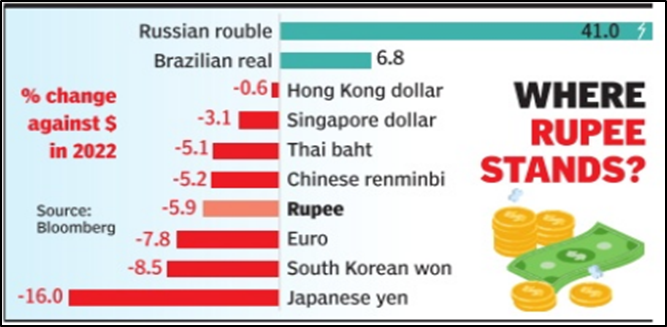In News:
- Recently, the Indian rupee fell to a new low against the US dollar, as domestic stock markets fell and foreign investors continued to sell Indian equities.
- The Indian rupee breached for the first time the Rs 79/$ level in post-market trade.
What’s in today’s article:
- Exchange rate (About, how is it determined, fluctuation in exchange rate, RBI’s role, what does falling rate signify)
- News Summary
Exchange rate:
- The exchange rate of the rupee against the US dollar tells us how many rupees are needed to purchase one US dollar.
- To purchase (import) a product or service from the United States, Indians must first purchase dollars and then use those dollars to purchase the product.
- The same is true when Americans purchase something from India.
- If the rupee's exchange rate falls (depreciation), purchasing American goods will become more expensive.
- Simultaneously, Indian exporters may benefit because their goods are now more appealing to American customers.
How is it determined?
- In a free-market economy, the exchange rate is decided by the supply and demand for rupees and dollars.
- In case, Indians demand more dollars in comparison to Americans demanding the rupee, the exchange rate will “fall” or “weaken” for rupee and “rise” or “strengthen” for dollar.
- However, in India, the market does not fully determine the exchange rate.
- The Reserve Bank of India (RBI) occasionally intervenes in the foreign exchange (forex) market to ensure that the rupee's price does not fluctuate too much or rises or falls too dramatically all at once.
- Fluctuation in rupee’s exchange rate: For simplicity, consider two scenarios -
- Crude oil prices rise dramatically: The ramifications for India, which imports 80% of its oil, would be that it would require more dollars to purchase crude oil in the international market.
- This would weaken the rupee because India's demand for dollars would have increased while global demand for the rupee remained unchanged.
- The US central bank raises its interest rates: Global investors who had been putting money in India (for which they demanded rupees) might consider withdrawing it and investing in the US (for which they would demand dollars instead). Again, the rupee would weaken.
The RBI’s role in this:
- To slow down the rupee's fall, the RBI would sell some of the dollars from its forex reserves in the market.
- This will absorb a large number of rupees from the market, narrowing the demand-supply gap between the rupee and the dollar.
- This is why the RBI's forex reserves have plummeted since the start of the Ukrainian conflict.
Significance of exchange rate
- The exchange rate is frequently used to gauge an economy's relative strength.
- The majority of developing economies run trade and current account deficits.
- The ultimate impact of a fall is determined by a number of factors.
- A fall in the rupee, for example, can benefit India's exporters - unless they import raw materials, which would become more expensive.
News Summary:

- Among Asian currencies, the rupee has outperformed during the current year.
- However, the recent decline (domestic currency has lost almost 6% during the current year) has caused it to underperform in comparison to the currencies of Singapore, Indonesia, Thailand, China and Malaysia.
- India is the only major emerging market with a large current account deficit and unlike other emerging markets, does not benefit significantly from currency depreciation.
- Multinational banks purchased dollars on behalf of foreign institutional investors, while public sector banks purchased dollars for importers such as oil companies.
- By selling billions of dollars from its reserves, the RBI has ensured that there are no wild swings in the exchange rate.
- Oil prices and overall dollar strength will determine whether the rupee remains above 79 or recovers.
- There is no reason for the rupee to reverse its course unless oil prices fall significantly.










